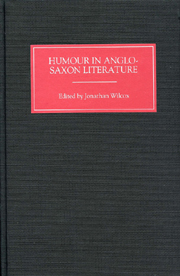Book contents
- Frontmatter
- Contents
- Contributors
- Acknowledgements
- Introduction
- Byrhtnoth's Laughter and the Poetics of Gesture
- ‘Grim Wordplay’: Folly and Wisdom in Anglo-Saxon Humor
- Humor, Wordplay, and Semantic Resonance in Beowulf
- Heroic Humor in Beowulf
- Humor in Hiding: Laughter Between the Sheets in the Exeter Book Riddles
- Sexual Humor and Fettered Desire in Exeter Book Riddle 12
- ‘Why do you speak so much foolishness?’ Gender, Humor, and Discourse in Ælfric's Lives of Saints
- A Funny Thing Happened on the Way to Heaven: Humorous Incongruity in Old English Saints' Lives
- Index
Introduction
Published online by Cambridge University Press: 12 September 2012
- Frontmatter
- Contents
- Contributors
- Acknowledgements
- Introduction
- Byrhtnoth's Laughter and the Poetics of Gesture
- ‘Grim Wordplay’: Folly and Wisdom in Anglo-Saxon Humor
- Humor, Wordplay, and Semantic Resonance in Beowulf
- Heroic Humor in Beowulf
- Humor in Hiding: Laughter Between the Sheets in the Exeter Book Riddles
- Sexual Humor and Fettered Desire in Exeter Book Riddle 12
- ‘Why do you speak so much foolishness?’ Gender, Humor, and Discourse in Ælfric's Lives of Saints
- A Funny Thing Happened on the Way to Heaven: Humorous Incongruity in Old English Saints' Lives
- Index
Summary
The first question of course was how to get dry again …
At last the Mouse, who seemed to be a person of some authority among them, called out ‘Sit down, all of you, and listen to me! I'll soon make you dry enough!’ They all sat down at once, in a large ring, with the Mouse in the middle. Alice kept her eyes anxiously fixed on it, for she felt sure she would catch a bad cold if she did not get dry very soon.
‘Ahem!’ said the Mouse with an important air. ‘Are you all ready? This is the driest thing I know. Silence all round, if you please! “William the Conqueror, whose cause was favoured by the pope, was soon submitted to by the English, who wanted leaders, and had been of late much accustomed to usurpation and conquest. Edwin and Morcar, the earls of Mercia and Northumbria –”’
‘Ugh!’ said the Lory, with a shiver.
[from Lewis Carroll, Alice's Adventures in Wonderland (1865; repr. New York, 1960), pp. 33–34.]Many consider Anglo-Saxon literature to be as moisture-sappingly dry as the mouse in Lewis Carroll's story thought Anglo-Saxon history. As the ever-popular Norton Anthology puts it, ‘The world of Old English poetry is predominantly harsh.’ The reasons for such an assessment are obvious. Modern desire privileges the tiny corpus of Old English heroic literature, characterized by its obsession with loyalty in a world of violence, where there seems to be little scope for humor.
- Type
- Chapter
- Information
- Humour in Anglo-Saxon Literature , pp. 1 - 10Publisher: Boydell & BrewerPrint publication year: 2000



